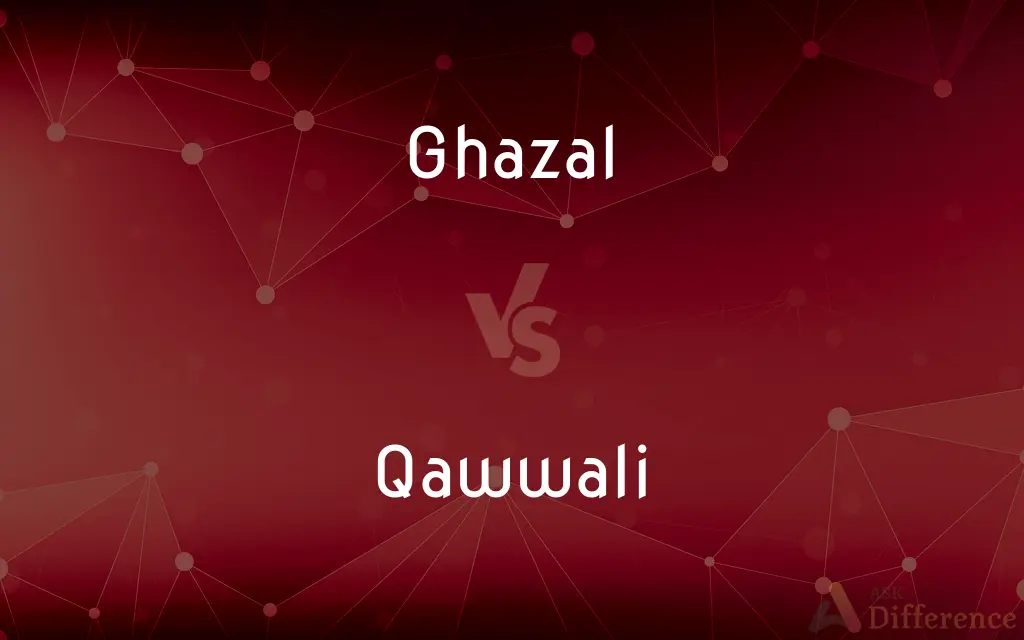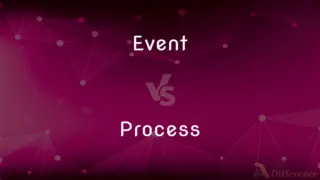Ghazal vs. Qawwali — What's the Difference?
Edited by Tayyaba Rehman — By Maham Liaqat — Updated on March 2, 2024
Ghazal is a poetic form expressing the pain of loss or separation and the beauty of love, while Qawwali is a form of Sufi devotional music designed to evoke spiritual devotion and connection.

Difference Between Ghazal and Qawwali
Table of Contents
ADVERTISEMENT
Key Differences
Ghazal, originating in ancient Persia, is a poetic form consisting of rhyming couplets and a refrain, with each line sharing the same meter. This form of poetry often explores themes of love, despair, and the mystique of the beloved, reflecting both earthly and divine love. Its verses stand alone, each capable of conveying an emotion or idea independently of the others. Qawwali, on the other hand, is a musical tradition that stems from the Sufi tradition of Islam, particularly prevalent in South Asia. It is characterized by vigorous rhythmic cycles, vocal improvisation, and a chorus of handclaps.
Ghazal poetry has been widely appreciated in South Asian literature, becoming a significant part of the cultural expression in countries like India and Pakistan. Qawwali aims to lead listeners to a state of spiritual ecstasy, facilitating a personal, experiential connection with the divine. The lyrics often include praises of Allah, the Prophet Muhammad, and other saints, as well as themes of divine love and longing.
While both ghazal and qawwali can express themes of love and spiritual longing, ghazal does so through poetic imagery and metaphors in a literary format, whereas qawwali uses music and vocal performance to evoke emotional and spiritual feelings. Ghazals are performed by a solo reciter or singer, focusing on the literary beauty of the words. In contrast, qawwali is performed by a group, with a lead singer and a chorus, along with instrumental accompaniment, creating a communal and interactive musical experience.
The ghazal's emphasis is on the subtlety and nuance of wordplay and metaphor, often leaving the interpretation open to the listener's imagination. Qawwali, through its repetitive musical phrases and dynamic delivery, seeks to diminish the distance between the performer and the listener, creating a shared spiritual experience.
While the ghazal and qawwali both hold significant places in South Asian arts and culture, they serve different purposes and evoke different responses. The ghazal captivates with its poetic elegance and emotional depth, while the qawwali offers a transcendent musical journey aimed at awakening the soul.
ADVERTISEMENT
Comparison Chart
Form
Poetic, consisting of rhyming couplets
Musical, involving vocal and instrumental performance
Origin
Ancient Persia
Sufi tradition of Islam
Themes
Love, loss, separation, divine love
Devotion, divine love, praise of Allah and saints
Performance
Solo recitation or singing
Group performance with lead and chorus, plus instruments
Purpose
Express emotion and ideas through poetry
Induce spiritual ecstasy and connection
Audience Interaction
More contemplative and introspective
Communal and interactive
Key Elements
Literary beauty, wordplay, metaphor
Rhythmic cycles, vocal improvisation, handclaps
Cultural Significance
Widely appreciated in South Asian literature
Central to Sufi devotional practices in South Asia
Compare with Definitions
Ghazal
A form of poetry with rhyming couplets and a refrain.
The poet's ghazal eloquently expressed unrequited love.
Qawwali
Involves group performance with music.
The qawwali group captivated everyone with their rhythmic harmony.
Ghazal
Each couplet stands independently.
Every couplet in a ghazal can be a poem in itself.
Qawwali
Features praises of the divine.
The lyrics of the qawwali praised the mystic love of the divine.
Ghazal
Explores themes of love and separation.
Her latest ghazal captures the pain of separation beautifully.
Qawwali
A form of Sufi devotional music.
The qawwali performance evoked a deep spiritual connection among the audience.
Ghazal
Focuses on the beauty of expression.
The beauty of a ghazal lies in its emotional depth and lyrical precision.
Qawwali
Aims for spiritual ecstasy.
Qawwali music is intended to lead the listener to a state of spiritual ecstasy.
Ghazal
Renowned in South Asian literature.
Ghazals have greatly influenced Urdu and Persian literary traditions.
Qawwali
Encourages communal participation.
The audience clapped along, becoming part of the qawwali experience.
Ghazal
The ghazal (Arabic: غَزَل, Bengali: গজল, Urdu: غزَل, Hindi: ग़ज़ल, Persian: غزل, Azerbaijani: qəzəl, Turkish: gazel, Uzbek: gʻazal, Gujarati: ગઝલ) is a form of amatory poem or ode, originating in Arabic poetry. A ghazal may be understood as a poetic expression of both the pain of loss or separation and the beauty of love in spite of that pain.The ghazal form is ancient, tracing its origins to 7th-century Arabic poetry.
Qawwali
Qawwali (Punjabi:قوّالی (Shahmukhi), ਕ਼ੱਵਾਲੀ (Gurmukhi); Urdu:قوّالی (Nasta'liq); Hindi: क़व्वाली (Devanagari); Bengali: কাওয়ালি (Bengali)) is a form of Sufi Islamic devotional singing, originating from the Indian subcontinent, and notably popular in the Punjab and Sindh regions of Pakistan; in Hyderabad, Delhi and other parts of India, especially North India; as well as the Dhaka and Chittagong Divisions of Bangladesh. Originally performed at Sufi shrines or dargahs throughout South Asia, it gained mainstream popularity and an international audience in late 20th century.
Ghazal
A poetic form of Persian origin, consisting of five or more syntactically complete couplets linked by rhyme and the repetition of a closing word or phrase.
Qawwali
A style of Muslim devotional music, especially among the South Asian Sufis, accompanied by drums and harmonium.
Ghazal
A poem in this form.
Qawwali
A song in this style.
Ghazal
A poetic form mostly used for love poetry in Middle Eastern, South, and Central Asian poetry.
Ghazal
A kind of Oriental lyric, and usually erotic, poetry, written in recurring rhymes.
Common Curiosities
Are there specific instruments used in qawwali?
Qawwali typically features harmoniums, tablas, and sometimes dholaks, creating its distinctive rhythmic and melodic sound.
Can ghazals be included in qawwali performances?
Yes, qawwali performances can incorporate ghazals, especially those with spiritual themes, blending poetic expression with musical devotion.
What is the main difference between ghazal and qawwali?
Ghazal is a poetic form focusing on themes of love and separation, while qawwali is a musical form aimed at inducing spiritual ecstasy.
How has the ghazal evolved over time?
The ghazal has evolved to include contemporary themes and languages, expanding beyond its traditional roots while maintaining its characteristic form.
What is the significance of the lead singer in qawwali?
The lead singer in qawwali is crucial, guiding the performance's emotional and spiritual intensity and interacting dynamically with the audience.
What role does the chorus play in a qawwali performance?
The chorus in a qawwali performance reinforces the lead singer's verses, adds to the rhythmic foundation with handclaps, and encourages audience participation.
How do performers learn qawwali?
Performers often learn qawwali through traditional apprenticeships within families or musical gharanas (schools), passing down techniques and repertoires through generations.
How do audiences typically respond to ghazal performances?
Audiences respond to ghazal performances with contemplative appreciation, often moved by the emotional depth and literary beauty of the poetry.
What makes a ghazal performance impactful?
The impact of a ghazal performance lies in the emotional resonance of the poetry, the expressiveness of the delivery, and the connection established with the audience.
Can ghazal and qawwali be considered purely religious?
While deeply rooted in spiritual and religious themes, both ghazal and qawwali also explore universal themes of love, longing, and human emotion, making them accessible to wider audiences.
Share Your Discovery

Previous Comparison
Event vs. Process
Next Comparison
Molest vs. HarassAuthor Spotlight
Written by
Maham LiaqatEdited by
Tayyaba RehmanTayyaba Rehman is a distinguished writer, currently serving as a primary contributor to askdifference.com. As a researcher in semantics and etymology, Tayyaba's passion for the complexity of languages and their distinctions has found a perfect home on the platform. Tayyaba delves into the intricacies of language, distinguishing between commonly confused words and phrases, thereby providing clarity for readers worldwide.














































